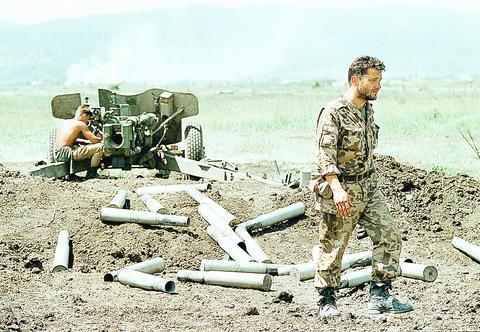Musleem is a dying breed of Chechen rebel -- he speaks flawless Russian, can recite Pushkin by heart and speaks fondly of ethnic Russian friends from university.
Five years after war began again in Chechnya, the average rebel is more like the young men Musleem shuttles between safehouses -- stumbling through Russian, with rudimentary (if any) education and happy to see most Russians through the viewfinder of a Kalashnikov rifle.

PHOTO: AFP
This bodes ill for Moscow, observers warn -- as the Kremlin's second war against Chechen rebels enters its sixth year, Russia is running out of people with whom it can make peace.
"We're losing not just the republic, but the people," a top Kremlin aide with intimate knowledge of Chechnya admitted to reporters last week.
"Moscow is not using its brains, ruling out all talks" with separatists, Musleem, a 40-something who is in charge of support for several hundred rebel fighters, told AFP recently in Chechnya.
"People like [former Chechen president and rebel leader Aslan] Maskhadov and me can relate to Russians, we can talk with them. Once we are gone, they'll have to deal with them," he said, nodding at two young 20-something fighters nearby. "And that will be much more difficult."
Chechen rebels today -- figures vary between 1,000 to 5,000, depending on the source -- are ready for ever more chilling tactics and have been infused with Islamic extremists from abroad.
The Kremlin brands them all "terrorists" who are funded and aided by international groups like al-Qaeda and has refused all negotiations.
The rebels divide largely into two groups -- those who wage a guerrilla war against state targets, led by Maskhadov, and those who launch terror attacks, led by feared warlord Shamil Basayev.
Basayev has admitted to some foreign fighters and funding, but says both are limited.
Observers and rebels say that Basayev's "radicalized" fighters are a minority -- accounting for as little as 10 percent of the total numbers of rebels, according Ruslan Aushev, the respected former chief of the neighboring republic of Ingushetia.
Their operations have gotten more horrific during the course of the war -- over the past year, women suicide bombers have blown up rock concerts, subways, trains and planes in Moscow and Russia proper.
They have also staged spectacular hostage takings, including one at a Moscow theater two years ago and at the Beslan school last month.
Aushev, the only Russian official to have gone inside the school and talked with the rebels at Beslan, said "they were much more cruel than during Nord-Ost," the theater hostage taking.
"The commander said `you can bring all our relatives here and shoot them, we'll shoot some of the hostages'" in return, he said.
Aushev, who served as Ingushetia's president before being pressured out in 2001 by the Kremlin, insists negotiations with the rebels are the only way to end the war and warns that otherwise, the situation will only get worse.
"The first [Chechen] war created the reality we have today ... Never in my wildest dreams did I think we would have women kamikazes in the Caucasus ... I can't even imagine what the second war will create. I simply can't imagine it," he said.
Chechens on the ground and analysts say that 31-year-old Aslan (who like all rebels asked that his real name not be used) is a sign of things to come -- an arm-carrying rebel who works in the law enforcement agencies of its pro-Moscow government.
In July Aslan received an offer he couldn't refuse -- the security service offered to take him under its wing. Today the 31-year-old freely walks about the streets of Grozny, where he wouldn't have dared to step in May.

BRUSHED OFF: An ambassador to Australia previously said that Beijing does not see a reason to apologize for its naval exercises and military maneuvers in international areas China set off alarm bells in New Zealand when it dispatched powerful warships on unprecedented missions in the South Pacific without explanation, military documents showed. Beijing has spent years expanding its reach in the southern Pacific Ocean, courting island nations with new hospitals, freshly paved roads and generous offers of climate aid. However, these diplomatic efforts have increasingly been accompanied by more overt displays of military power. Three Chinese warships sailed the Tasman Sea between Australia and New Zealand in February, the first time such a task group had been sighted in those waters. “We have never seen vessels with this capability

A Japanese city would urge all smartphone users to limit screen time to two hours a day outside work or school under a proposed ordinance that includes no penalties. The limit — which would be recommended for all residents in Toyoake City — would not be binding and there would be no penalties incurred for higher usage, the draft ordinance showed. The proposal aims “to prevent excessive use of devices causing physical and mental health issues... including sleep problems,” Mayor Masafumi Koki said yesterday. The draft urges elementary-school students to avoid smartphones after 9pm, and junior-high students and older are advised not

Philippine President Ferdinand Marcos Jr has fired his national police chief, who gained attention for leading the separate arrests of former Philippine president Rodrigo Duterte on orders of the International Criminal Court and televangelist Apollo Carreon Quiboloy, who is on the FBI’s most-wanted list for alleged child sex trafficking. Philippine Executive Secretary Lucas Bersamin did not cite a reason for the removal of General Nicolas Torre as head of the 232,000-member national police force, a position he was appointed to by Marcos in May and which he would have held until 2027. He was replaced by another senior police general, Jose

POWER CONFLICT: The US president threatened to deploy National Guards in Baltimore. US media reports said he is also planning to station troops in Chicago US President Donald Trump on Sunday threatened to deploy National Guard troops to yet another Democratic stronghold, the Maryland city of Baltimore, as he seeks to expand his crackdown on crime and immigration. The Republican’s latest online rant about an “out of control, crime-ridden” city comes as Democratic state leaders — including Maryland Governor Wes Moore — line up to berate Trump on a high-profile political stage. Trump this month deployed the National Guard to the streets of Washington, in a widely criticized show of force the president said amounts to a federal takeover of US capital policing. The Guard began carrying